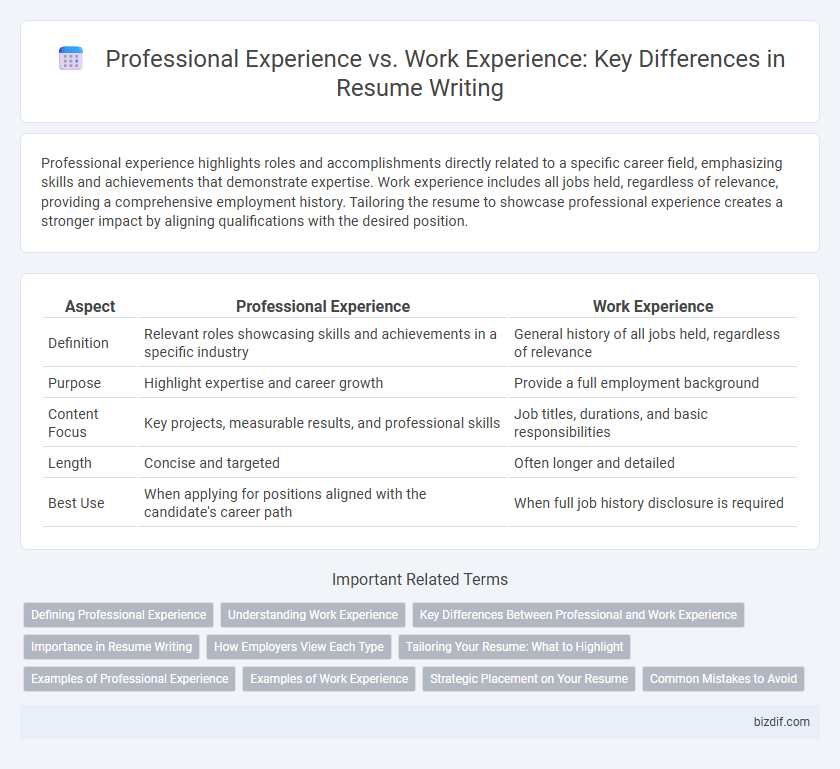Professional experience highlights roles and accomplishments directly related to a specific career field, emphasizing skills and achievements that demonstrate expertise. Work experience includes all jobs held, regardless of relevance, providing a comprehensive employment history. Tailoring the resume to showcase professional experience creates a stronger impact by aligning qualifications with the desired position.
Table of Comparison
| Aspect | Professional Experience | Work Experience |
|---|---|---|
| Definition | Relevant roles showcasing skills and achievements in a specific industry | General history of all jobs held, regardless of relevance |
| Purpose | Highlight expertise and career growth | Provide a full employment background |
| Content Focus | Key projects, measurable results, and professional skills | Job titles, durations, and basic responsibilities |
| Length | Concise and targeted | Often longer and detailed |
| Best Use | When applying for positions aligned with the candidate's career path | When full job history disclosure is required |
Defining Professional Experience
Professional Experience refers to relevant job roles that demonstrate skills, achievements, and responsibilities aligned with career goals, emphasizing expertise and industry-specific accomplishments. It highlights positions that showcase professional growth, leadership, and contributions beyond basic job duties. This section differentiates from Work Experience by focusing on roles that add strategic value and directly relate to the applicant's targeted profession.
Understanding Work Experience
Work experience refers to the practical roles and jobs a person has held, showcasing hands-on skills and responsibilities directly related to a career path. It includes all positions, internships, and part-time jobs that contribute to one's employment history. Understanding work experience helps tailor a resume to highlight relevant accomplishments and transferable skills that match the job description.
Key Differences Between Professional and Work Experience
Professional experience highlights roles and accomplishments directly related to a specific career path, emphasizing industry-specific skills and expertise. Work experience encompasses all jobs held, including unrelated or entry-level positions, showcasing overall employment history and transferable skills. Employers often prioritize professional experience to assess candidates' suitability for specialized roles within a field.
Importance in Resume Writing
Professional Experience emphasizes relevant roles that showcase industry-specific skills and accomplishments, making it crucial for tailoring a resume to targeted job applications. Work Experience encompasses all job history, providing a comprehensive view but may dilute focus if unrelated to the desired position. Highlighting Professional Experience effectively demonstrates expertise and value to employers, increasing the chances of interview selection.
How Employers View Each Type
Employers often view Professional Experience as evidence of relevant skills and accomplishments directly tied to a candidate's industry or career goals, highlighting roles with strategic impact and leadership responsibilities. Work Experience encompasses all jobs held, including part-time or unrelated positions, providing a broader picture but sometimes diluting focus on key qualifications. Prioritizing Professional Experience in a resume helps streamline evaluation by emphasizing expertise and achievements that align with the employer's needs.
Tailoring Your Resume: What to Highlight
Tailoring your resume requires distinguishing between professional experience and work experience by emphasizing relevant skills and accomplishments that align with the job description. Highlight measurable achievements, specific responsibilities, and industry-related expertise under professional experience to demonstrate competency and impact. Use work experience to showcase a broader range of roles, focusing on transferable skills and consistency in employment history.
Examples of Professional Experience
Professional experience highlights roles and accomplishments directly related to your career goals, such as managing a marketing campaign that increased brand engagement by 30% or leading a software development team to deliver a critical project ahead of schedule. Work experience encompasses a broader range of jobs, including part-time or unrelated positions, like retail associate duties that build customer service skills. Examples of professional experience are vital for demonstrating industry-specific expertise, such as financial analysts preparing detailed investment reports or teachers designing curriculum that improved student performance.
Examples of Work Experience
Work experience encompasses all jobs and roles held, highlighting responsibilities and skills gained, such as managing sales teams or developing marketing campaigns. Professional experience focuses on relevant positions aligned with career goals, like leading a software development project or coordinating client consultations. Detailed examples of work experience, including measurable achievements like increasing revenue by 20% or reducing processing time by 30%, enhance resume impact.
Strategic Placement on Your Resume
Strategic placement of Professional Experience versus Work Experience on your resume depends on the role and industry, highlighting relevant accomplishments that align with the job description. Professional Experience emphasizes specialized skills and leadership roles, while Work Experience covers a broader range of jobs that demonstrate reliability and growth. Position the section that best showcases your value at the forefront to capture recruiters' attention and improve applicant tracking system (ATS) ranking.
Common Mistakes to Avoid
Confusing professional experience with work experience often leads to vague or irrelevant resume content that fails to highlight key skills and achievements. Avoid listing every job chronologically without emphasizing roles that demonstrate industry-specific expertise or measurable impact. Tailoring experience to showcase relevant accomplishments and quantifiable results improves resume effectiveness and attracts recruiter attention.
Professional Experience vs Work Experience Infographic

 bizdif.com
bizdif.com